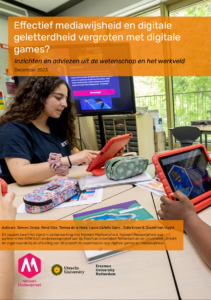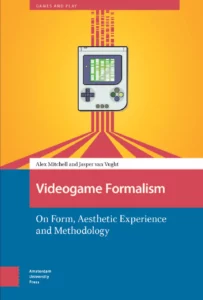
How to improve media literacy skills through the use of digital games.

On September 20, 2023, the Dutch Media Literacy Network (Netwerk Mediawijsheid) organized an expert event in which researchers, educators, developers and other literacy-related groups convened to discuss the current state of Educational games and apps. The main question was how we can improve media literacy skills through the use of digital games. The trigger for this event was a research project by researchers from Utrecht University and Erasmus University Rotterdam called “DIGITAL LITERACY GAMES: Digital games designed to support digital literacy skills acquisition”, funded by a KIEM Go-Ci grant by Regieorgaan SIA (part of NWO). The results of this research project were presented during the event and, among other presentations, formed the basis for several expert discussions.
The results of this expert event have now been published in a report called Enhancing Effective Media and Digital Literacy through Digital Games: Insights and Advise from Research and the Work Field (translated from Dutch), authored by Jeroen Jansz (EUR), René Glas (UU) and Teresa de la Hera (EUR) with support from Laura Cañete Sanz, Julia Kneer (EUR), and Jasper van Vught (UU). The main results are presented on the website of the Dutch Media Literacy Network here. On this website, the nine main recommendations based on these results are presented. They are (translated from Dutch):
- Invest time, effort, and money in teamwork. Game design often occurs in teams, but teams of teachers and other experts are also valuable in the field where digital games are applied.
- Organize and listen to the voices of children, young people, and other potential users of digital literacy games.
- Take inclusive design as a starting point; consider it a creative challenge and benefit from the knowledge and experience of the target audience(s).
- Strengthen public values in games about digital literacy and media literacy by designing them from a public values perspective. Where that is not possible, provide transparent insight into potential private (commercial) interests.
- Expand the number of media literacy competencies addressed in new games or in new series of games.
- Build on the enthusiasm and expertise of individuals and teams at the forefront of using games for change, but also consider the extra effort that pioneering projects often require.
- Investigate not only the effects of the digital game on players but also analyze which design principles contribute to the success of the game.
- Take advantage of research results and connect internal game design principles (like those related to visualization, realism, feedback loops) with contextual design principles (like scalability, reviewing the game, and feedback on a game’s design).
- Strengthen the transparency of the quality assurance of games about digital literacy and media literacy, for example, through a certification-like quality mark that shows whether and in what way the game adheres to recommendations 2, 3, 4, 5, and 8.
The full report can be downloaded directly via this link. A short 10-points design tips document for effective media literacy games based on the research project can be downloaded directly via this link.





